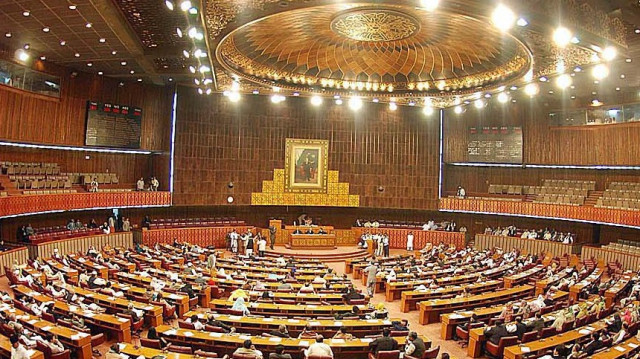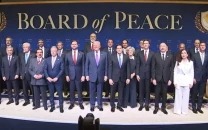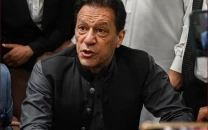Guaranteeing secrecy: ECP bars use of cell phones, cameras during vote
Disallows members of parliament and provincial assemblies from taking photographs of stamped ballots.

National Assembly of Pakistan. PHOTO: APP/FILE
The upcoming presidential election promises to be different from others in at least one important way. No one, for instance, will be asking for any evidence – such as a snapshot of the stamped ballot paper -- to prove their loyalty when members of parliament and provincial assemblies vote for the country’s next president on July 30.
Barely 48 hours before the election, the Election Commission of Pakistan (ECP) barred assemblymen and senators from carrying mobile phones or any other electronic gadget through which pictures can be taken during the process of voting. The move is aimed at ensuring secrecy of the ballot.

The commission issued a statement drawing attention of the members to Article 12 of the Second Schedule of the Constitution, which underscores the need for secrecy of the ballot.
In this regard, “the Chief Election Commissioner/Returning Officer has directed that the presiding officers for the presidential election shall ensure that the secrecy of the ballot is not violated through any mode whatsoever by the voters and has also imposed ban upon members of parliament and all provincial assemblies for taking with them mobile phone or any other electronic device, through which picture can be taken, in the premises of the polling station, assembly chamber, by the members of parliament and the members of the provincial assemblies on July 30, the day of elections,” said the ECP in a statement.
In December last year, members of the Balochistan Assembly did not observe the rules and disclosed their votes while ousting former speaker Aslam Bhootani.
Bhootani later challenged his removal, saying it was in violation of the Constitution and the rules of procedure. He contended before the Balochistan High Court (BHC) that during the secret ballot, members of the provincial assembly disclosed their vote to government officials, in clear violation of the rules.

“Yes, we are mindful of what has happened in the Balochistan Assembly,” a senior ECP official told The Express Tribune while explaining the motive behind the move. “We want to enforce the law and protect the sanctity of the secret ballot,” he added.
There is a possibility that some MPs might take pictures of the stamped ballot papers during the presidential election in order to prove their loyalty to a particular candidate and political party, he added.
“It is an open secret that votes are for sale and mobile phones or other electronic devices are used to prove that those MPs have voted in favour of a candidate. However, this time around they will not be allowed to take snapshots at the time of the vote,” he said.
Responding to a question, he said that around 2,000 ballot papers have been printed and were being dispatched to the provinces. Though the total number of members of parliament and provincial assembly is 1,123, the extra ballot papers have been printed so that a member can be given a fresh one in case the ballot paper is damaged.
According to the Article 15 of the second schedule, “If a ballot paper is spoiled by a person voting, he may return it to the presiding officer, who shall issue a second ballot paper, cancelling the first ballot paper and marking the cancellation on the appropriate counterfoil.”
Responding to a question, he said that the election result will be announced the next day (July 31) but there is a possibility of an official announcement on the actual polling day.
Published in The Express Tribune, July 29th, 2013.



















COMMENTS
Comments are moderated and generally will be posted if they are on-topic and not abusive.
For more information, please see our Comments FAQ